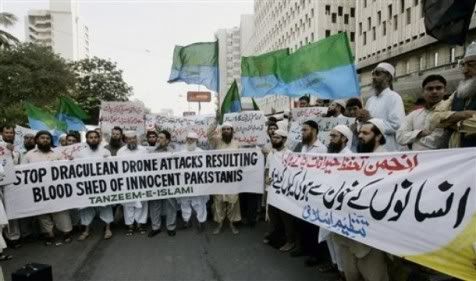The recent visit to Pakistan by the U.S Special Envoy Richard Holbrooke and Admiral Mike Mullen highlighted the growing differences between Pakistan and the United States on how to tackle the threat of Pakistani Taliban. At another level, their visit also signified an emerging consensus between Pakistan’s political leadership and security establishment that it can not afford to give in to the U.S. demands and need to chart a different course.

As a recent Dawn editorial noted, the visiting U.S. team was taken aback by the tone of Pakistani officials. Instead of arm-twisting Pakistan into agreeing to joint military operations in the tribal areas, they were confronted with a barrage of criticism and the visit ended with a rare and public acknowledgment of the differences between the two sides. While the PML-N chief Nawaz Sharif has been forceful in his opposition to these attacks for quite some time, it appears that the Prime Minister Gilani, President Zardari and the COAS Gen. Kiyani has finally thrown their weight behind this argument. Also a recent report from the bipartisan National Security committee condemned such attacks in the “strongest possible manner”.
Ironically its the Americans that deserve most of the “credit” for causing this convergence of thinking in Pakistan. A sustained campaign of charges in the U.S. press against the ISI for its alleged links with militants led by the senior U.S. Generals coupled with the threat of an expansion in drone attacks to cover Baluchistan and settled parts of Pakistan has finally convinced the national leaders to come out against the U.S. plans. Pakistan is also frustrated at the United States for its failure to make Pakistan’s strategic interests in Afghanistan a part of its new strategy for the region.

While it is too early to know if Pakistan can put up enough resistance to stop these attacks by unmanned aircrafts, it is good to see the change in nation’s attitude. Sovereignty is something that you either use or loose and in the case of Pakistan, we have opted for the later for the past 8 years. No one can deny the emerging threat of Taliban emanating from Pakistan’s tribal belt yet no sovereign country can allow such attacks by a foreign power. The western media often cites the killing of high-level Taliban and Al-Qaeda leaders to justify such tactics but they often fail to recognize the impact of such attacks at the strategic level: in addition to the backlash caused by the civilian casualties, these attacks put Pakistan government and army in an impossible situation that they can’t possibly cope with. They have also caused the Taliban to move eastwards into the more settled areas where such attacks are not possible due to population density. A recent report in the Foreign policy magazine summarized the situation as follows:
The US administration justified the drone attacks by claiming it would deny the militants a ‘safe haven’ in Pakistan.‘This line of argument sounds persuasive, but it falls apart on closer examination. For starters, it is not clear that al Qaeda requires a safe haven to do damage, especially since the original organisation has metastasised into smaller groups of sympathisers.’
The magazine pointed out that only a large-scale invasion could eliminate al Qaeda from the region but such an invasion was impossible and therefore there was little reason to continue the drone attacks.
‘US military strikes in Pakistan —even limited ones —tend to undermine the Pakistani government and increase the risk that Pakistan will become a failed state,’ the report noted.



















































Pakistan must chart its own course but also there is no need to make enemies on the way. US is blamed for everything bad in our country and we never look at our own shortcomings and mistakes.
It is just like Balochistan and other provinces blaming Punjab for everything bad within those provinces. It is some sort of complex that we hate America but given the chance most Pakistanis would like to live in USA under the laws of that so called
Actually we are the nation whose leaders prefer dollars over Sovereignty. This is American money because of which even if some place is hit in Pakistan from other side of the border, our government can take its responsibility on its own shoulders. “Give us money and attack us” Now this should be come to an end. Our army “Allah’s Mujahdeens” should counter american drawn atacks because people of Pakistan will be with them if it do so otherwise people may further lose their trust on army and all the problems should be sorted out through dialog. One thing must be realized by us Pakistanis, instead of relying on foreign aid and technology we should do research by our own selves. We must improve our standard of education. In short, The policy of national self reliance should be pursued as it is only thing because of which we Pakistanies could be regarded as a respectable nation in the world and make progress in real terms.
Our children are forced to stay home on account of the threat of terror… militants have forced the state to capitulate in its own territory (Swat) … Punjab govt is sponsoring local version of the KKK … and Balochistan is burning without any attention from any one…
And you are talking about “drone attacks”? Bus kardo bus!
It really doesn’t matter to me who kills these extremely brutal people who hide behind their version of sharia to commit anything they want.
the protest against drone attacks is irrational at best; at worst it is topi drama by the pak establishment. we can talk all we want about our sovereignty but if we cannot demonstrate control over its own territory, such protest is going to fall on deaf ears. to make matters worse we also continue to be aggressively out there with the begging bowl demanding 10 where donors are reluctant to offer even 1. that does not make for a good bargaining position.